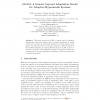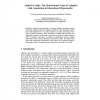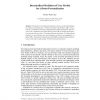AH
2006
Springer
14 years 6 months ago
2006
Springer
This paper introduces GLAM, a system based on situation calculus and meta-rules, which is able to provide adaptation by means of selection of actions. It is primarily designed to p...
AH
2006
Springer
14 years 6 months ago
2006
Springer
Users often revisit pages while browsing the Web, yet little is known on the character of these revisits. In this paper we present an analysis of various revisit activities, based ...
AH
2006
Springer
14 years 6 months ago
2006
Springer
The design of Web applications traditionally relies heavily on the navigation design. The Web as it evolves now brings additional design concerns, such as omni-presence, device-dep...
AH
2006
Springer
14 years 6 months ago
2006
Springer
Adaptive link annotation is a popular adaptive navigation support technology. Empirical studies of adaptive annotation in the educational context have demonstrated that it can help...
AH
2006
Springer
14 years 6 months ago
2006
Springer
Abstract. Conversational recommender systems adapt the sets of products they recommend in light of user feedback. Our contribution here is to devise and compare four different mec...
AH
2006
Springer
14 years 6 months ago
2006
Springer
Nowadays, the information overload highlights the importance of personalization systems providing services according to users' interests and needs, as expressed by their User ...
AH
2006
Springer
14 years 6 months ago
2006
Springer
The growth of available personalization services and the heterogeneity in content and representation of therein exploited User Models (UMs), raise a need for a mechanism allowing t...
AH
2006
Springer
14 years 6 months ago
2006
Springer
The volume of course-related information available to students is rapidly increasing. This abundance of information has created the need to help students find, organize, and use re...
AH
2006
Springer
14 years 6 months ago
2006
Springer
This paper provides a solution to discourse structure adaptation in the process of automatic hypermedia presentation generation. Existing approaches to discourse structure composit...
AH
2006
Springer
14 years 6 months ago
2006
Springer
Current adaptive systems acquire information about users mainly by simple tracking of resources, a user has requested and by asking users to supply the needed information. In this ...



